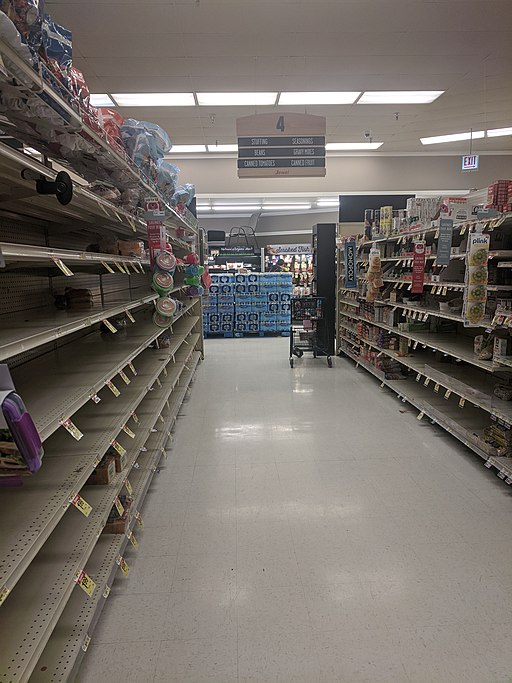Foodways in the Midst of a Pandemic
Cynthia C. Prescott, University of North Dakota
Social distancing. Shelter in place. Runs on toilet paper and sanitizing wipes. Schools and houses of worship indefinitely. Life in the midst of a global pandemic is unfamiliar and even frightening. The spread of COVID-19 virus is teaching many of us living in urban places just how connected we are to one another, and how divorced we have become from rural life. But as the coronavirus spreads, the impact of virus-related disruptions will also have profound impacts on households located at great distances from one another—and from big-box stores’ massive supply chains.

Aisle for bread and other items at a Jewel supermarket in the Lincoln Square neighborhood of Chicago on 13 March 2020 during the COVID-19 pandemic. Photo by I JethroBT / CC BY-SA (https://creativecommons.org/licenses/by-sa/4.0)
It is already changing our eating habits. Throughout the United States, store shelves are stripped bear of bread, pasta and baking supplies. Restaurants are closing their dining rooms. For those with sufficient resources, stress-baking and stress-eating (and drinking) is increasingly commonplace. Others face growing hardships. School cafeterias are closed, and many are searching for ways to continue to feed hungry children who rely on school nutrition programs for most of their meals.
Amid this global crisis, and as many of us must adjust to teaching and working remotely, our work continues on Backstories: The Kitchen Table Talk Cookbook. To those essays already planned, we also seek to document experiences of shifting foodways in the midst of global pandemic.
Help us document how COVID-19 is impacting you and your community. Send us your thoughts and experiences, whether 5 words, 50, or 500 or more. Send us recipes—and images!—of foods you are consuming as the virus spreads. Document your family’s impromptu baking competition, or your creativity with canned and dried foods. Comment on this post, or email your thoughts to: RW**********@gm***.com. We’ll share your contributions in Backstories and/or on our social media accounts, and archive them for future generations.
